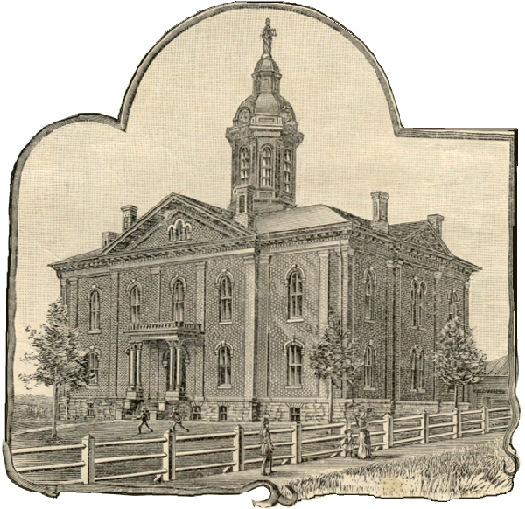THE GOVERNMENT OF CLARK COUNTY, WISCONSIN
"Clark County Illustrated" by Saterlee, Tifft & Marsh; 1890
Transcribed by Tiffiney Hill
Visit The American Local History Network!|
Clark County Court House, Neillsville, Wisconsin This structure was erected during the years 1875 and 1876. It is solid brick, is 100 feet long by 64 feet wide and was built at a cost of $35,000. The first floor above the basement is divided into six large offices which are occupied by the County Clerk, County Treasurer, County Judge, District Attorney, Clerk of the Circuit Court, and Register of Deeds. The main part of the second floor is occupied as a Circuit Court room, the balance of which is divided into three consolation rooms, a jury room and a Sheriff's office. "Clark County Illustrated" by Saterlee, Tifft & Marsh; 1890 |
|
Realizing that this Prospectus will be circulated principally outside of Wisconsin, where different forms of governments exist, it seems proper that we devote some space to a general description of ours. The state legislature consists of two branches, the assembly and senate, which are composed of one hundred members and thirty-three members respectively. The state is, therefore, divided into one hundred assembly districts and thirty-three senate districts. Clark county forming one complete assembly district, has one representative in the assembly. It forms a portion of a senate district, which district has one representative in the senate.The whole of Clark County formerly consisted of one town (Pine Valley) but as the county was gradually settled up other towns were formed, until at the present time the county is divided into twenty-four towns. The legislative branch of the county government is known as the county board of supervisors, and consists of one member from each of the towns, and three from the city of Neillsville, making twenty-seven members. The regular conventions of this board occur annually in November, and special sessions are called when emergencies require it. The members of this board are chosen by the electors in their respective towns for one year. They receive a per diem and mileage as compensation for their services for attendance at the meetings of the county board. The judicial branch of the county government is vested in the justices of the peace of the several towns, who have jurisdiction of civil cases up to $200, and of minor criminal cases, in probate, and Circuit Courts. The state is divided into fifteen circuits each of which contains on an average four or five counties, and is presided over by one judge who is chosen by the electors in each circuit. From two to four terms of this court are held in each county annually, and by far the larger part of litigation is carried on in this county. The county officers consist of a county clerk, county treasurer, a clerk of the circuit court, a district attorney, a county judge, (or probate judge), a sheriff, a county superintendent of schools, a county surveyor and a coroner. The duties of each officer is suggested by his title. These officers are al chosen by the electors of the county, and all for the term of two years, except the county judge, who is chosen for four years. The towns, which are twenty-four in number, in this county, consist usually of one township, which is a tract of land six miles square, though some of the towns have more than one township. Each of these towns have a board of supervisors consisting of three members, elected by the people of the town each year, the chairman of which board is ex officio, the representative of the town on the county board. Each town also has a clerk, a treasurer, an assessor and four justices of the peace. The towns are divided into road districts, with an overseer of highways in each district. The county is extremely well provided with roads for as new county as it is and within a few years there will be a graded highway around nearly every section of land in the county with many high ways on quarter section lines. The requisite qualifications of electors in the state are the same as those of most other states viz: that the person be a male citizen, of sound mind and of the age of twenty-one years or upwards. No property or educational qualifications required. Women are allowed the privilege of voting at election pertaining exclusively to school matters and also of holding school offices. On the whole, the citizens of the state may feel justly proud of its system of town and county government and its results. |
